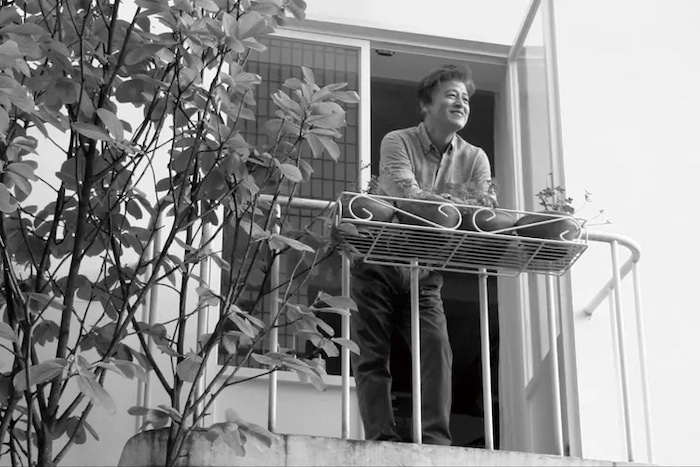
Hong Sangsoo’s newest Japan theatrical release could have been titled Quitting, just like Zhang Yang’s criminally overlooked 2001 feature about an actor on the verge of actually cracking up. It’s one of the few Hong movies of recent memory where dramatic themes take precedence over form and style, and for the most part the main characters are all in the process of giving up something, namely their vocations as creatives. The title he chose describes the small apartment building where all the action takes place, a structure without an elevator, thus necessitating ambulatory movement between floors, which sort of mimics the life trajectory these people follow. Real estate as real life.
Byung-soo (Hong regular Kwon Hae-hyo) brings his adult daughter, Jeong-su (Park Miso), to the building to meet the landlord, Mrs. Kim (Lee Hye-yeong), a successful interior designer, to see if she might advise Jeong-su on pursuing a similar career. Jeong-su studied painting in university but decided that there’s no money in art, or, at least, not in fine art. During one of Hong’s typical, prolonged drinking sessions, we learn that Byung-soo, a moderately successful film director, has been estranged from Jeong-su’s mother, and, effectively, from Jeong-su, too, for about a decade. When Byung-soo is called away temporarily, Jeong-su and Mrs. Kim continue drinking and opening up to each other about Byung-soo, but also about Jeong-su’s uncertain future (“You just need to have taste”), and Mrs. Kim drunkenly takes her on as an assistant. However, when Byung-soo returns, we soon realize that it is years later, and that Jeong-su has quit her job with Mrs. Kim and is now doing something entirely different. Byung-soo is merely dropping in to see his old friend and, again, they start drinking, this time with Sunhee (Song Seon-mi), the proprietor of the small restaurant that rents space in the building. Like Jeong-su, Sunhee once wanted to be a painter but found it wasn’t for her, and as the wine flows she becomes overly solicitous of Byung-soo, claiming she’s seen every one of his films and found them very enjoyable. (“There’s lots of dialogue, so I drink while I watch them”) At the same time, Byung-soo expresses frustration with the whole business of making films since he has to spend so much time finding financial backers. Following another time slip, we see Sunhee driving Byung-soo’s beloved vintage Mini Cooper and understand they are now married and renting an apartment in the building. Moreover, Byung-soo has essentially given up films and is taking time off for his health, a situation that causes friction not only between him and Sunhee, but between the couple and Mrs. Kim, who it turns out is a lousy landlord.
This elliptical journey of dissipation doesn’t end there. Sunhee is eventually replaced in Byung-soo’s life by a real estate agent, Jiyoung (Cho Yun-hee), who happily indulges all his worst habits, thus sealing his fate as a has-been who not only has no future, but no real past, because everyone has abandoned him and he doesn’t seem to care. That is, except Mrs. Kim, who herself gave up interior decorating, but is still a bad landlord. Hong’s tone throughout is resolutely sardonic, nowhere more so than during a non sequitur scene in which Byung-soo, napping off a late afternoon alcohol buzz, imagines in voiceover how he will either break up or make up with Sunhee, a fantasy whose manifestation we don’t see. As others have already pointed out, Hong banishes the most important incidents of his plot offscreen, and all we see is the intentions leading up to these momentous decisions and what it is they leave behind.
In Korean. Now playing in Tokyo at Human Trust Cinema Yurakucho (03-6259-8608), Shinjuku Cinema Qualite (03-3352-5645).
Walk Up home page in Japanese
photo (c) 2022 Jeonwonsa Film Co.
